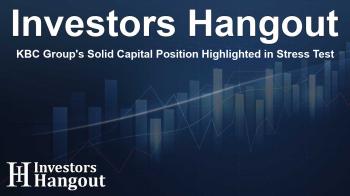KBC Group's Solid Capital Position Highlighted in Stress Test

Understanding KBC Group's Financial Health
KBC Group is known for its robust financial position, which has been underscored by recent announcements made by the European Banking Authority (EBA) regarding the results from the 2025 EU-wide stress test. This stress test aims to evaluate the resilience of banks under hypothetical economic scenarios to ensure they can sustain operations during economic downturns.
KBC's Performance in Stress Testing
The EBA released insightful results concerning the stress test. Under the base scenario, KBC's fully loaded Common Equity Tier-1 (CET1) ratio is projected to rise from 14.56% at the end of 2024 to 17.22% by the end of 2027. This increase of 2.66 percentage points is a strong indicator of KBC’s financial health and its ability to withstand economic challenges.
Adverse Scenarios and KBC's Resilience
In the adverse scenario presented by the EBA, KBC's fully loaded CET1 ratio is expected to decline by 2.73 percentage points to 11.82% by the end of 2027. Remarkably, this outcome is substantially better than the findings from the 2023 EBA stress test, showcasing KBC's adaptive strategies and strong capital management.
KBC Group's Commitment to Stakeholders
Johan Thijs, the CEO of KBC Group, commented on the results, emphasizing that thorough testing provides valuable insights into capital requirements, enhancing trust and reassurance among stakeholders. He reiterated that KBC’s solid liquidity position, fortified by a loyal customer deposit base, empowers the group to support the communities it serves continuously.
Insights into the EU-wide Stress Test
The EBA, in collaboration with the National Bank of Belgium (NBB), the European Central Bank (ECB), and the European Systemic Risk Board (ESRB), conducted this stress test to assess banking resilience. Unlike past tests, this one does not impose a pass-fail threshold but provides crucial information for evaluating compliance with supervisory requirements.
Analyzing the Stress Test Methodology
The adverse stress test scenario set by the ECB/ESRB covers a three-year horizon from 2025 to 2027 and applies a static balance sheet assumption based on data from December 2024. It's important to note that the stress test is not a forecast of KBC's profits, but rather an exercise to understand its capital performance under pressure.
Resources for Stakeholders
For further insights, the EBA’s website contains an extensive set of Q&As and detailed methodologies relevant to the stress test scenarios. This information serves not just KBC but the entire banking sector as a comparative benchmark for resilience against financial turbulence.
Conclusion: KBC's Long-term Stability
With KBC Group's proactive measures and consistently strong fundamentals, the institution appears well-positioned to navigate the challenges of tomorrow’s banking environment. Its capacity to manage pressure while safeguarding stakeholder interests illustrates KBC’s dedication to maintaining a solid financial foundation, enabling it to support its strategic initiatives and the communities it serves effectively.
Frequently Asked Questions
1. What does the EBA stress test evaluate?
The EBA stress test evaluates the resilience of banks to adverse economic scenarios, helping assess their capital adequacy and risk management strategies.
2. What is KBC Group's CET1 ratio according to the stress test?
KBC Group's CET1 ratio is expected to increase to 17.22% by the end of 2027 under the base scenario of the stress test.
3. Who conducted the stress test with the EBA?
The stress test was conducted in cooperation with the National Bank of Belgium, the European Central Bank, and the European Systemic Risk Board.
4. What are the implications of the adverse stress test results for KBC?
The results indicate a decline in KBC's CET1 ratio to 11.82%, demonstrating the institution's ability to withstand economic shocks significantly better than in previous tests.
5. How does KBC ensure its commitment to stakeholders?
KBC's strong capital ratios and consistent performance in stress tests reassure stakeholders of its financial strength and commitment to supporting their interests and the community.
About The Author
Contact Dylan Bailey privately here. Or send an email with ATTN: Dylan Bailey as the subject to contact@investorshangout.com.
About Investors Hangout
Investors Hangout is a leading online stock forum for financial discussion and learning, offering a wide range of free tools and resources. It draws in traders of all levels, who exchange market knowledge, investigate trading tactics, and keep an eye on industry developments in real time. Featuring financial articles, stock message boards, quotes, charts, company profiles, and live news updates. Through cooperative learning and a wealth of informational resources, it helps users from novices creating their first portfolios to experts honing their techniques. Join Investors Hangout today: https://investorshangout.com/
The content of this article is based on factual, publicly available information and does not represent legal, financial, or investment advice. Investors Hangout does not offer financial advice, and the author is not a licensed financial advisor. Consult a qualified advisor before making any financial or investment decisions based on this article. This article should not be considered advice to purchase, sell, or hold any securities or other investments. If any of the material provided here is inaccurate, please contact us for corrections.

